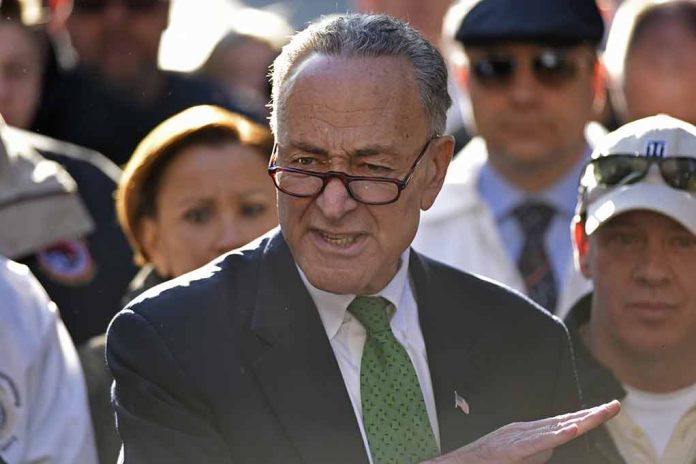
A Delta Air Lines crash in Toronto sparks a heated political debate over aviation safety responsibility, with Chuck Schumer and Karoline Leavitt at odds over the root cause.
Key Takeaways
- A Delta Air Lines plane crashed at Toronto Pearson Airport, with all 80 passengers and crew surviving.
- Chuck Schumer blamed Trump’s FAA cuts for the crash, despite it occurring in Canadian airspace.
- Karoline Leavitt criticized Schumer’s comments as “irresponsible” and factually incorrect.
- The incident has ignited a debate on international aviation oversight and political narratives.
- Investigators are examining weather, human error, and aircraft malfunction as possible causes.
Political Clash Over Aviation Safety
In the wake of a Delta Air Lines crash at Toronto Pearson Airport, a political firestorm has erupted between Senator Chuck Schumer and Press Secretary Karoline Leavitt. The incident, which saw all 80 passengers and crew members survive despite the plane catching fire and flipping, has become a focal point for debate on aviation safety and political responsibility.
Schumer wasted no time in pointing fingers, claiming that President Trump’s cuts to the Federal Aviation Administration (FAA) workforce contributed to the crash. He argued that the layoffs, which included safety specialists, had made American skies less safe. However, Leavitt swiftly countered these accusations, highlighting a crucial fact, the crash occurred in Canadian airspace and was overseen by Canadian air-traffic controllers stating, “It’s incredibly irresponsible for Chuck Schumer to say such a thing when the investigation is still underway.”
Karoline Leavitt blasts ‘irresponsible’ Chuck Schumer for blaming Delta plane crash on Donald Trump — even though it was in Canada https://t.co/UruGD0yQvV pic.twitter.com/EwLywLG4ts
— New York Post (@nypost) February 19, 2025
Jurisdictional Debate and Factual Discrepancies
The political exchange has brought to light the complexities of international aviation oversight. Schumer attempted to justify his stance by emphasizing that the flight originated in Minneapolis, suggesting that FAA involvement was still relevant going on to say “To those asking whether it matters that the plane’s destination was in Canada: The flight took off from Minneapolis. The FAA was still responsible for inspecting the aviation equipment, and Trump just let go of FAA safety specialists.” However, Leavitt countered this argument by asserting that no U.S. air traffic controllers were laid off during the Trump administration.
Leavitt further emphasized the Trump administration’s focus on merit-based hiring in federal agencies, including the FAA. She highlighted efforts by Secretary Sean Duffy to recruit skilled air traffic controllers, contradicting Schumer’s narrative of widespread layoffs affecting aviation safety.
Crash Details and Ongoing Investigation
The crash itself involved a Bombardier CR900 aircraft landing in difficult weather conditions. The plane caught fire and flipped, resulting in a dramatic scene at Toronto Pearson Airport. Despite the severity of the incident, all 76 passengers and four crew members survived, with 18 passengers treated for injuries, including a four-year-old child who was taken to a Toronto hospital.
Investigators are currently examining multiple factors that could have contributed to the crash, including weather conditions, potential human error, and possible aircraft malfunction. Video footage showed the plane’s right wing shearing off as it burst into flames, providing crucial evidence for the ongoing investigation.
Broader Implications for Aviation Safety
This incident comes at a time when aviation safety is under increased scrutiny following several crashes earlier in the year, including a deadly collision involving a US Army helicopter and an American Airlines jet. The political debate surrounding the Toronto crash has highlighted the need for clear communication and accurate information when discussing aviation safety measures and responsibilities.
As the investigation continues, it serves as a stark reminder of the complexities involved in international air travel and the importance of cooperation between nations in ensuring passenger safety. The incident also underscores the potential consequences of politicizing aviation safety issues before all facts are known, potentially undermining public trust in the air travel system.



